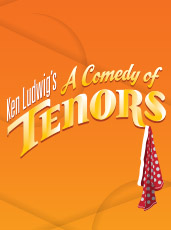
 by Jim Beckerman
by Jim Beckerman
view article on Playbill.com
Encore, encore.
Which is operaese, as you know, for “more, again.” That – no more, no less – is what Paper Mill Playhouse is offering through Feb. 26. With the applause of four years ago still clearly ringing in their ears, they’ve brought back most of their 2013 cast of “Lend Me a Tenor” for a return engagement.
“A Comedy of Tenors,” playwright Ken Ludwig’s follow-up to his immensely popular slamming-door farce (originally produced on London’s West End in 1986), once again spotlights the formidable comic talents of John Treacy Egan as an egomaniacal opera star, Judy Blazer as his temperamental wife, Michael Kostroff as his high-strung manager, David Josefsberg as a mild-mannered factotum, and Donna English and Jill Paice in new but not dissimilar roles.
All of them go through pretty much the same paces as they did last time: misunderstandings, mistaken identities, door-slamming entrances and exits in various states of undress, all in a very similar hotel suite under the precise, metronome-tick direction of – once again – Don Stephenson.
Nothing very new here – as indeed there wasn’t really anything too new about the original “Lend Me a Tenor,” a French bedroom farce descended from a long line of French bedroom farces. Originality and novelty aren’t really the point. Almost the contrary: The fun is in seeing the familiar patterns emerge, the routine complications mount and cascade.
What counts is the skill of the playwright in spinning his web, the effectiveness of the director in keeping the pace lively, and the inventiveness of the actors in finding double-takes, unexpected vocal mannerisms, “business” generally. In all these departments: bravissimo.
But if familiarity is forgivable in this kind of farce, it’s also true that “A Comedy of Tenors” pushes it to the limit. The characters, the hotel setting (though a different hotel), the basic situation are almost identical to “Lend Me a Tenor.” Even the Marx Brothers made a point of varying the locales for their routines: an ocean liner in one film, a racetrack in another.
What these actors do, however, they do supremely well. Anyone who applauded them in “Lend Me a Tenor” won’t mind a second helping. Egan as the blustery opera star Tito and Judy Blazer as his demonstrative wife are especially good, though you may suspect a friendly rivalry between them as to who can come up with the most preposterous accent.
“She is a young woman – she’s got oorges,” Blazer explains (the subject is their daughter’s romantic inclinations). “That’s impossiblay,” replies the thunderstruck Egan. Though at that, the two of them may be outdone by English as a visiting Russian prima donna. “Men are afraid of me, I am not knowing why,” she says.
This 1930s-set farce benefits, as did its predecessor at Paper Mill, from the performance of Kostroff as the tightly wound manager: He seems to be channeling half a dozen Hollywood character actors who played similar roles in 1930s movies (Walter Connolly comes to mind). Josefsberg is again winning as Kostroff’s eager assistant, now himself making the transition to opera singer.
Paice is droll as a highly self-dramatizing would-be actress. And Ryan Silverman, the only non-holdover from the 2013 cast, brings chiseled abs and good timing to the role of Tito’s younger rival. As in the earlier play, this one also gives several of the actors a chance to show off their vocal chops: in this case it’s Kostroff, Josefsberg and Silverman, doing the “Libiamo” from “Traviata.”
All of them fit comfortably into the playwright’s well-worn grooves. If “A Comedy of Tenors” doesn’t bring much that’s new to the table (other than tongue, which we won’t get into), it serves up its old ingredients with style. Familiarity doesn’t necessarily breed contempt. To put it in opera terms: almost every Rossini overture sounds like almost every other Rossini overture. And as it happens, they’re all pretty enjoyable.

Comments are closed.